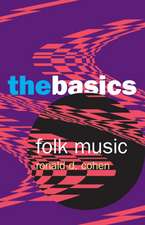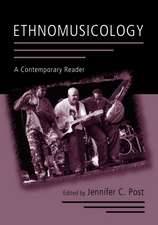Representing African Music: Postcolonial Notes, Queries, Positions
Autor Kofi Agawuen Limba Engleză Hardback – 16 mai 2003
| Toate formatele și edițiile | Preț | Express |
|---|---|---|
| Paperback (1) | 356.79 lei 6-8 săpt. | |
| Taylor & Francis – 16 mai 2003 | 356.79 lei 6-8 săpt. | |
| Hardback (1) | 1008.53 lei 6-8 săpt. | |
| Taylor & Francis – 16 mai 2003 | 1008.53 lei 6-8 săpt. |
Preț: 1008.53 lei
Preț vechi: 1229.91 lei
-18% Nou
Puncte Express: 1513
Preț estimativ în valută:
193.04€ • 209.76$ • 162.26£
193.04€ • 209.76$ • 162.26£
Carte tipărită la comandă
Livrare economică 21 aprilie-05 mai
Preluare comenzi: 021 569.72.76
Specificații
ISBN-13: 9780415943895
ISBN-10: 0415943892
Pagini: 288
Ilustrații: 15 Illustrations, color
Dimensiuni: 152 x 229 x 24 mm
Greutate: 0.69 kg
Ediția:1
Editura: Taylor & Francis
Colecția Routledge
Locul publicării:Oxford, United Kingdom
ISBN-10: 0415943892
Pagini: 288
Ilustrații: 15 Illustrations, color
Dimensiuni: 152 x 229 x 24 mm
Greutate: 0.69 kg
Ediția:1
Editura: Taylor & Francis
Colecția Routledge
Locul publicării:Oxford, United Kingdom
Recenzii
"presents a new way to think about African music. . . . obligatory reading." -- Grant Olwage, South African Journal of Musicology
"few books in recent years have pursued a more ambitious agenda. . .without any doubt the most powerful theoretical intervention in African musicology in a decade or more. . . by a long stretch, one of the most edgy and stylish pieces of writing on the politics of culture in postcolonial Africa to have appeared of late." -- Veit Erlmann, Music Theory Spectrum
"strikingly original.. upset[s] applecarts of convention and dispassionate prose. . . engag[es] readers in thorough, lively, critical debate about African music and Africanist musical scholarship. . .will be required reading for students of ethnomusicology, music theory, and historical musicology for some time." -- Gabriel Solis, Notes
"At times frankly informative, at times darkly ironic, and at times passionately earnest, Representing African Music reads like a resource text, satire, and manifesto all at once...[offers a] trenchant critique of otherwise neutral-seeming representations of African music.. makes many daring statements and reaches a series of alarming conclusions...Those in search of a genuinely global musical discourse...could do much worse than begin their quest by reading Agawu's Representing African Music. His is the unmistakable voice of authentic hope." -- Martin Scherzinger, Current Musicology
"unfailingly intelligent, well informed, and closely argued . . .lucidly and elegantly written. . .stimulating and provocative. . provides an African outlook on controversies that have been primarily covered by scholars in Europe and the United States. . .filled with incisive observations." -- Richard M. Shain, International Journal of African Historical Studies
"This is a strikingly original book, promising to shed new light both on music from across the African continent, and on the history of Africanist musical discourse. Upsetting apple carts of convention and dispassionate prose, this book, while sure to elicit controversy from virtually all corners of contemporary American musical scholarship, should be required reading not only for African music theorists, and historical musicologist with an interest in the politics of representation.
Kofi Agawu's Representing African Music does an excellent job of engaging readers in a thorough, lively, critical debate about African music and Africanist musical scholarship." -- Gabriel Solis, University of Illinois,Urbana-Champaign,Notes
"few books in recent years have pursued a more ambitious agenda. . .without any doubt the most powerful theoretical intervention in African musicology in a decade or more. . . by a long stretch, one of the most edgy and stylish pieces of writing on the politics of culture in postcolonial Africa to have appeared of late." -- Veit Erlmann, Music Theory Spectrum
"strikingly original.. upset[s] applecarts of convention and dispassionate prose. . . engag[es] readers in thorough, lively, critical debate about African music and Africanist musical scholarship. . .will be required reading for students of ethnomusicology, music theory, and historical musicology for some time." -- Gabriel Solis, Notes
"At times frankly informative, at times darkly ironic, and at times passionately earnest, Representing African Music reads like a resource text, satire, and manifesto all at once...[offers a] trenchant critique of otherwise neutral-seeming representations of African music.. makes many daring statements and reaches a series of alarming conclusions...Those in search of a genuinely global musical discourse...could do much worse than begin their quest by reading Agawu's Representing African Music. His is the unmistakable voice of authentic hope." -- Martin Scherzinger, Current Musicology
"unfailingly intelligent, well informed, and closely argued . . .lucidly and elegantly written. . .stimulating and provocative. . provides an African outlook on controversies that have been primarily covered by scholars in Europe and the United States. . .filled with incisive observations." -- Richard M. Shain, International Journal of African Historical Studies
"This is a strikingly original book, promising to shed new light both on music from across the African continent, and on the history of Africanist musical discourse. Upsetting apple carts of convention and dispassionate prose, this book, while sure to elicit controversy from virtually all corners of contemporary American musical scholarship, should be required reading not only for African music theorists, and historical musicologist with an interest in the politics of representation.
Kofi Agawu's Representing African Music does an excellent job of engaging readers in a thorough, lively, critical debate about African music and Africanist musical scholarship." -- Gabriel Solis, University of Illinois,Urbana-Champaign,Notes
Cuprins
Acknowledgements Introduction 1. Colonialism's Impact 2. The Archive 3. The Invention of African Rhythm 4. Polymeter, Additive Rhythm, and Other Enduring Myths 5. African Music as Text 6. Popular Music Defended Against its Devotees 7. Contesting Difference 8. How Not to Analyze African Music 9. The Ethics of Representation Epilogue References













